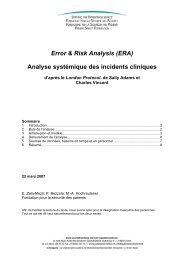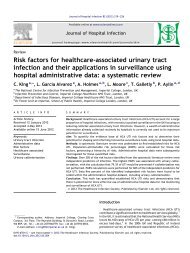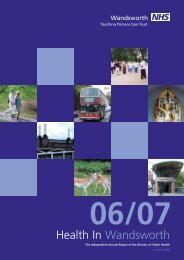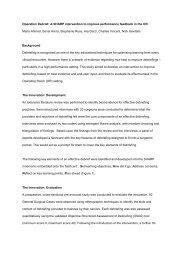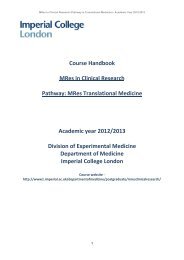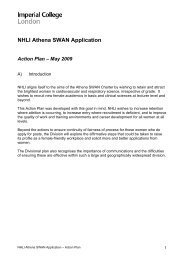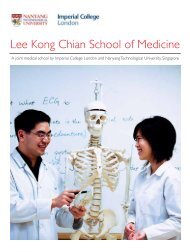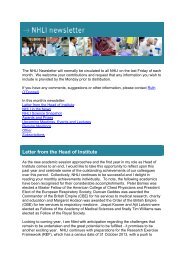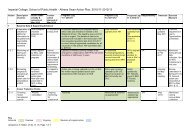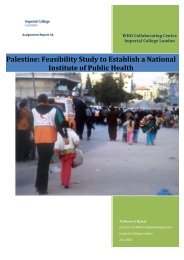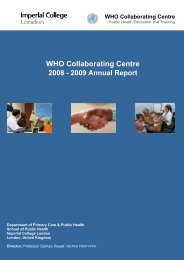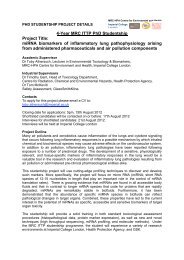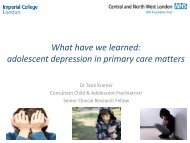QOF Plus Year 1 - Imperial College London
QOF Plus Year 1 - Imperial College London
QOF Plus Year 1 - Imperial College London
Create successful ePaper yourself
Turn your PDF publications into a flip-book with our unique Google optimized e-Paper software.
Methodology for the development of new indicatorsIn addition to the indicator areas selected through the structured local consultation, the groupdeveloped new indicators for ethnicity recording (incorporating recording of first language) anddata quality (records). In addition, funding was made available by the PCT in the later stages ofthe project for the incentivisation of indicators relating to additional non-clinical domains. Toinform development of new <strong>QOF</strong>+ non-clinical indicators, a member of the group conducted aninitial brief review to assess the importance of each indicator area (on the basis of nationalguidance and the local context), which Healthcare Commission core standards would be met byinclusion of the proposed indicators, and the anticipated training and development needs.For each selected new indicator area, a literature review of the evidence base was undertaken,and this was used to guide development of indicators, ensuring that new indicators would reflectbest available evidence. National policy and relevant national guidelines, as well as evidence oflocal performance and evaluations of relevant Local Enhanced Services (LES) schemes, includingthe Hammersmith and Fulham CVD Primary Prevention LES and the Lewisham Alcohol LES(Mookherjee, 2007), were used to inform the process. A database of national and <strong>London</strong>-basedLES schemes was created by the group which acted as an additional resource for indicatordevelopment. Consultation also took place with recognised national and international experts inselected indicator areas including alcohol and data quality (records), and with relevant localservices including the Hammersmith and Fulham Drug and Alcohol Team. The process of indicatordevelopment was also informed by the <strong>QOF</strong> evidence-based reports produced by the NationalPrimary Care Research and Development Centre (National Primary Care Research andDevelopment Centre, 2008). These reports were generated by the nationwide call for evidence tohealth professionals and patient groups in Spring 2007 and published evidence base. Each reportand its associated set of indicators was “commented on by members of the Royal <strong>College</strong> ofGeneral Practitioners Patient Participation Group and IT experts to ensure that proposedindicators made sense to patients and would work within primary care IT systems” (NationalPrimary Care Research and Development Centre, 2008).Proposed new <strong>QOF</strong>+ indicators were discussed at regular face-to-face <strong>QOF</strong>+ development groupmeetings and through email between group members, in order to further revise and refine them.An evidence-based “<strong>QOF</strong>+ Report” on each indicator was produced. This was modelled on theevidence-based reports produced as part of the national <strong>QOF</strong> process, and incorporated similarheadings (where appropriate) including proposed indicators, background, priority and relevanceto national policy, prevalence of condition, associated morbidity and mortality, review ofevidence, degree of perceived professional consensus, degree of perceived support from patientsand carers, health impact, and workload and implications for primary care. Additional categoriesrelating to local context, impact on health inequalities and training implications for primary carewere also included.During the final few months prior to launch of the <strong>QOF</strong>+ scheme, the Department of Healthannounced a number of new Directed Enhanced Services (DES), which include Alcohol andEthnicity (NHS Employers, 2008). In light of this, the alcohol and ethnicity indicators for <strong>QOF</strong> <strong>Plus</strong>were reviewed and revised to ensure they were in line with the DES, and this process wasfacilitated by discussions with national and international experts in these areas.134



